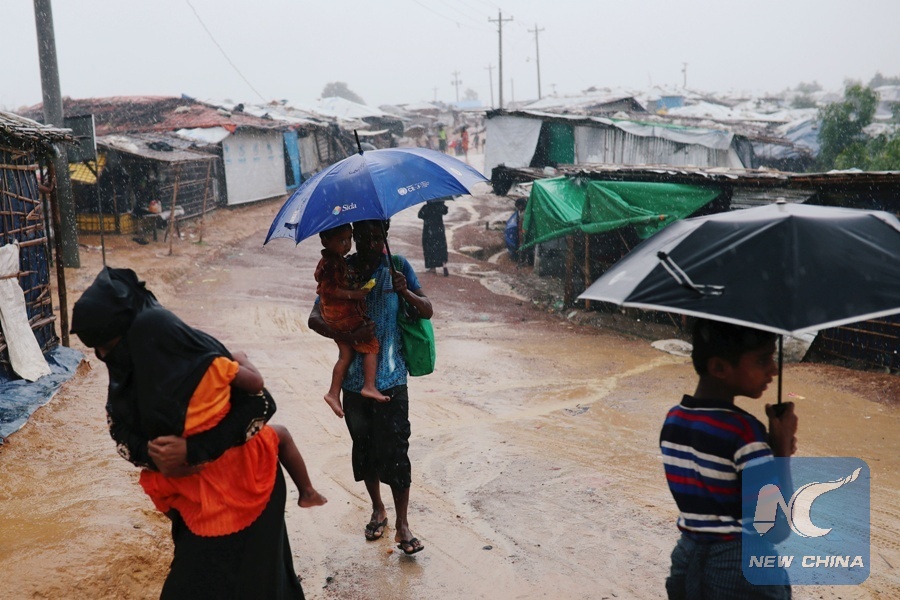
Rohingya refugees with their child walk with umbrella at the Kutupalong camp during heavy rain in Cox's Bazar, Bangladesh, July 4, 2018. (REUTERS Photo)
UNITED NATIONS, July 17 (Xinhua) -- The United Nations on Tuesday called for greater international assistance not only to the Rohingya refugees but also for their host communities in South and Southeast Asia, particularly neighboring Bangladesh.
In a note to correspondents, the UN special envoy of the secretary-general on Myanmar, Christine Schraner Burgener, underlined the need for greater international assistance to the refugees and host communities in addressing "the harsh conditions" they continue to face and also in terms of mitigating the risk of monsoons.
More than 1 million Rohingya have fled their homes in Myanmar's northern Rakhine State, according to the UN Refugee Agency (UNHCR), since last August when a deadly rebel attack on security posts triggered waves of raping, killing and the torching of villages by government and civilian militia forces.
The refugees fled as far as Malaysia and Indonesia, but mainly to neighboring countries, with the overwhelming number going to adjacent Bangladesh.
The special envoy just concluded her first official visit to Bangladesh, from July 14-16. In Dhaka, the capital, she met with Prime Minister Sheikh Hasina, the diplomatic community and the UN country team.
"The ongoing crisis requires a political solution that addresses the underlying issues," the special envoy said in the note issued here at UN Headquarters.
In Cox's Bazar, she visited the sprawling refugee camps -- housing more than 600,000 Rohingya -- and heard personal accounts of "unimaginable atrocities" committed in Rakhine State. The special envoy was "deeply moved" by their personal stories and their strength, according to the note.
She said that the ongoing crisis requires a political solution that addresses the underlying issues.
In all discussions during the visit, the special envoy underlined the importance of accountability for the crimes committed.
Updating the interlocutors on her recent visits to Myanmar the special envoy expressed her support for implementation of the Nov. 23, 2017 Memorandum of Understanding (MOU) between Bangladesh and Myanmar, and the June 6 MOU between the Government of Myanmar, the UNHCR and the UN Development Program (UNDP) as important first steps.
She said that their implementation should begin as soon as possible along with other measures towards "a conducive environment for the voluntary, safe, dignified and sustainable return" of the people to their place of origin or choice, according to the note.
It remains her priority to help address the root causes of the crisis, including through implementation of the recommendations of the Advisory Commission on Rakhine State, in particular ending restrictions on basic rights such as freedom of movement and resolving the citizenship issue.
Myanmar generally has not granted citizenship to the Rohingya, regarding them as Bangladeshi Muslims, living in their overwhelmingly Buddhist Myanmar illegally.
There is an urgency for all concerned to take concrete measures towards the MOU goals, the envoy said, adding that the United Nations stood ready to provide relevant experiences and expertise in this regard, according to the note. The envoy also called attention to the importance of UN principles, including the promotion and protection of human rights.
Another UN visitor to the Rohingya in Bangladesh camps was William Lacy Swing, head of the UN Migration Agency (IOM). He said that it was crucial for the world to remain focused on the crisis, warning that as monsoon rains turned many hillsides to mud and with just one quarter of joint funding appeal for the entire response met so far, much of the progress made in recent months was at serious risk of collapsing.
He also said that, in addition to the refugees' needs, the crisis was having a tremendous impact on the host community, a problem that also needed to be addressed.

